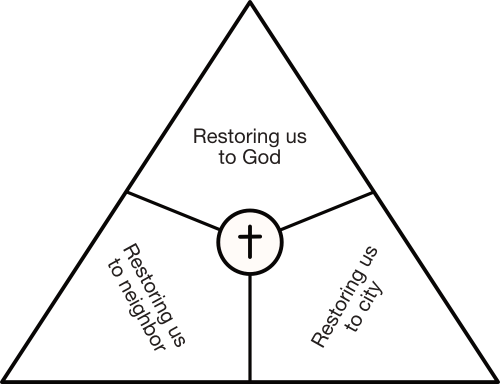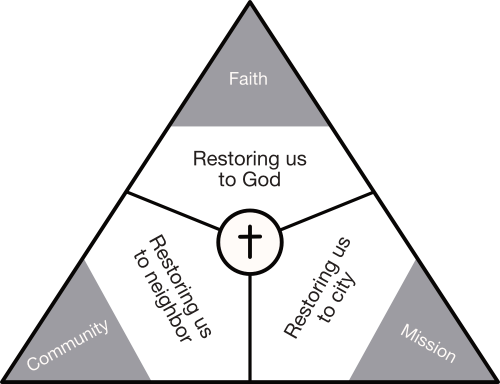Restoring us to God, neighbor, and city through the good news of Jesus Christ.
An Ache We All Feel
No doubt you've felt it. We live in a world where, while certainly there is plenty that is still beautiful and right, there is so much that is wrong. Brokenness touches every human being. It riddles our relationships. It bores under our skin and brittles our bones. It lays claim to our minds and hearts. There's an abiding ache in the soul. We feel it. But we don't know why it's there or what to do about it.
Our confusion in all of this hasn't stopped us from chasing a myriad of possible solutions—take this pill; attend that seminar; purchase this car; get that job; marry this person; no, wait, marry that person; get this surgery; start that diet; and on and on it goes. But the ache abides.
A Rescue We All Need
Meanwhile, into the brokenness, God speaks and acts. Grace! We were created in His image—to live in His presence, as His people, for His grander purposes. In our sin, we have spiraled out and away from these ancient designs. But in His Son He is drawing us back in! He is restoring what we have made a mess of. He is healing what brokenness has terrorized. He is putting the fractured pieces of our hearts back together. And the ache subsides.
The Mission of Mercy Hill
The church is God's idea—the outworking of His plan for rescue and redemption in the world. Therefore, any mission statement a local church puts forward, best be aligned with the larger mission of God Himself. It's with this in mind that we at Mercy Hill humbly identify our collective mission as follows . . .
Mercy Hill Church exists to help restore us to God, neighbor, and city through the good news of Jesus Christ.
to Help Restore US
The idea of restoration here implies the repairing of something broken, the return to something that once was. It presupposes the fact that the way things are is not the way things are supposed to be—not the way things were designed to function. It touches on the idea that this world, and even we ourselves, are fallen, distorted, broken. And we need help, we need rescue, we need restoration. And that is just what Jesus has come to provide!
Therefore, this is what we as a church have to offer you in Him. The church is God's restoration project. And we get the joy of partnering with Him in this great work!
Through the Good News of Jesus Christ
But how exactly is Jesus going to do this? Well, skip to the end of our statement and you see it. Restoration comes "through (or by way of) the good news of Jesus Christ." The "good news of Jesus Christ" is just another way of talking about the gospel—all that Jesus accomplished for us at the cross.
We have found it helpful to emphasize that this gospel is in fact good news because it keeps ever before us something we are often prone to forget. Consider the words of Tim Keller here as he channels the ideas of the late Welsh minister Martyn Lloyd-Jones:
Some years ago, I heard a tape series . . . by David Martyn Lloyd-Jones, an evening sermon series on 1 Corinthians 15. And he made a distinction that was extremely clarifying . . . how the gospel is based on historical events in a way that other religions just aren’t. He said there is a big difference between good advice and good news. The gospel, he would say, is good news, not good advice. Here’s what he said about that: "Advice is counsel about something to do and it hasn’t happened yet, but you can do it. . . . News is a report about something that has happened—you can’t do anything about it—it’s been done for you and all you can do is respond to it."
So he says, "Now think this out. Here is a king and he goes into a battle against an invading army to defend his land. If the king defeats the invading army, he sends back to the capital city messengers . . . He sends back 'good news-ers'. And what they come back with is a report. They come back and they say, 'It has been defeated! It’s all been done! Therefore, respond with joy and now go about your lives. Conduct your lives in this peace which has been achieved for you.' But if he doesn't defeat the invading army, if the invading army breaks through, the king sends back military advisers and says, 'Swordsmen over here, and marksmen over here, and the horsemen over here. We’re going to have to fight for our lives.'"
Dr. Lloyd-Jones says, "Every other religion sends military advisers to people. Every other religion says, 'You know, if you want your salvation, you’re going to have to fight for your life.' Every other religion is sending advice, and saying, 'Here are the rights, here are the rituals, . . . and here are the laws and the regulations. Earthen works over here, marksmen over here, horsemen over here. Fight for your life.' But we send heralds; we send messengers not military advisers." (What Is Gospel-Centered Ministry?)
Every other religion offers advice on how to fix the brokenness we all experience, but this only burdens and breaks us down further. Only Christianity is brave enough to hold out the twofold reality that: (1) We can't fix this ourselves; but (2) God can and has already done the decisive work in Jesus. On the cross, Christ took our sin and brokenness upon Himself. He experienced the full weight of them in His death. But, on the third, at break of dawn, He rose again, victorious . . . with good news to proclaim!
The battle has been won for you in Jesus. We can be restored upward to God, inward to neighbor, and outward to city because Jesus has come down to us. He meets us in the mess and changes everything!
Therefore, we as a church are jealous to make sure we are always holding out not mere "good" advice, but the good news of Jesus Christ. There is no hope for our restoration outside of His finished work.
To God
Most everybody in our day would admit that there is something wrong with the world and, even, with themselves. But, if we were to go out and talk to people on the streets around our city, it is likely that few would say they think all of this is resulting from some fundamental fracture in their relationship with God. They’re not thinking about God. They don’t care about God. And that's the problem.
The good news of Jesus Christ, before it does anything else, restores us to God. Jesus leads a people dying of thirst back to the Fountain of living water (Jer 2:13; John 4:10).
Restoring us to God through the good news of Jesus Christ directs our energies as a church upward. If we are not restored to God through Christ, we cannot even begin to be restored in these other directions (Lam 5:21).
To Neighbor
When we’ve been restored to God in Christ, we can finally start to enter into relationships with other people. Until then, sure, we have relationships, but it’s all ultimately still about us. We need something from them.
We hang out with those richer, smarter, "cooler" than us because it helps our image. We hang out with those more needy than us because it makes us feel better about ourselves. We hang out with those who are like us because they enjoy the same sorts of things as we do. Every relationship is run through the grid of self-concern—“What am I going to get out of it?” Because we’re still thirsty at a fundamental, soul level.
But then we meet Jesus, and He plugs us into God, into living water. We come to find that, even though we’re sinners, we are loved and secure and forgiven in Him. And do you know what happens? In our relationships with other people, no longer do we have something to prove, something to get. Now we actually have something to give!
Restoring us to neighbor through the good news of Jesus Christ directs our energies as a church inward—because we believe that the only way we are truly going to be restored to neighbor, to other people, is if we are brought into the family of God and establish relationships around the gospel (Eph 2:13-16).
To City
A city is the place we inhabit—the place we work, rest, play, and live. The idea of being restored to city, then, is this idea of being restored to a sense of purpose and joy in the place we occupy. It’s gaining a clearer sense of why we’re here, what we’re doing, and who we’re doing it all for.
When we are brought back to God and into His family, the church, we enter a story so much bigger than ourselves. We start to see so much more worth living for. Even common, everyday activities begin to shimmer with eternal significance. Whether we eat, drink, or whatever we're doing, we want to do it all in love for Him and for others (1 Cor 10:31).
Restoring us to city through the good news of Jesus Christ directs our energies as a church outward. We’re not just about connecting us to God and one another and then hunkering down until Jesus returns. No! We go back into the city with a renewed sense of purpose and joy. We want others to know what we've found in Christ!
Consider the following diagram as a way of visualizing what we've unpacked here:

Our Values
Through the years, we've identified three core values that have really marked all that we are and want to be about as a church: Faith, Community, and Mission.
These three core values really serve to put a finer point on the three directions identified in our mission statement. In every case, they answer the question: How?
- How is a person restored upward to God through the good news of Jesus Christ? Answer: By Faith that is fixed upon that good news.
- How is a person restored inward to neighbor through the good news of Jesus Christ? Answer: By Community that is centered around that good news.
- How is a person restored outward to city through the good news of Jesus Christ? Answer: By Mission that is mobilized by that good news.
Adding our values now to the previous diagram, it would look something like this:

